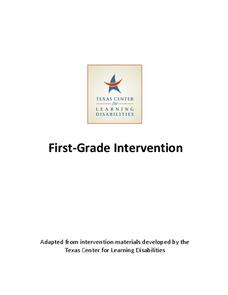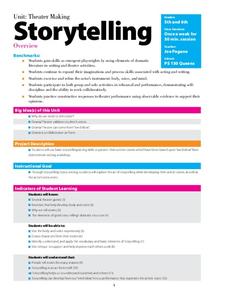Texas Center for Learning Disabilities
First-Grade Intervention
Learning how to read is a big challenge for young learners, but this series of lessons provides them with the extra support they need to succeed. With each lesson following the a clearly outlined format, children are introduced to new...
Have Fun Teaching
Making Inferences Special Night (12)
Young writers will enjoy clowning around with this worksheet that asks them to use clues in Katie's story to infer what is happening. Careful readers won't be tricked. The activity is a real treat.
Have Fun Teaching
Making Inferences (11)
Picture this. Kids read a story starter about Josh and his dad, use details in the tale to infer what will happen next, and then draw a picture of this outcome.
Have Fun Teaching
You Make the Call (10)
What will happen next? Young writers plot what will happen next after studying the clues in four story starters.
Have Fun Teaching
Who Am I? (14)
What's the difference between a clown and a cashier? Use context clues to infer what each character does for a living in five different reading passages. Kids mark their choices on the space provided.
Have Fun Teaching
When Am I? (16)
How can you tell when a story takes place? Use context clues to infer the time of day and seasons of five short reading passages. Kids then note each passage's time period as daytime or nighttime, as well as winter or summer.
Have Fun Teaching
Making Inferences (8)
Kids examine the clues provided by a prompt to infer what will happen next. They then illustrate the short story.
Have Fun Teaching
Where Am I? (15)
Guess the setting in a series of reading passages that allow learners to make inferences. Five short descriptions prompt kids to match one of four settings, based on context clues.
Have Fun Teaching
Making Inferences Something Special (13)
Work on making inferences with a reading passage and comprehension questions. After kids read a short paragraph about Jalisa's birthday, they infer why she would be excited about receiving gifts from her brother.
Have Fun Teaching
Making Inferences (7)
Why did Carla shut the window? Why did Benny feed his puppy? Why did the train blow its whistle? Why did Mom's car have a flat tire? Young readers consider cause and effect relationships in order to draw inferences from four situations...
Have Fun Teaching
Making Inferences (6)
The story of Petey and Ralphie provides readers with the perfect opportunity to practice using clues in a text to draw inferences. The questions that follow the story direct readers' attention to details that imply rather than directly...
Core Knowledge Foundation
A Time for All Seasons - Winter
As the days get shorter and a chill enters the air, it's time to start teaching your little ones about the wondrous winter season. Through a series of teacher demonstrations, whole-class read alouds and discussions, and hands-on...
Core Knowledge Foundation
A Time for All Seasons - Fall
The weather is cooling down and the leaves are starting to change color; fall is right around the corner. Celebrate this special time of year with this earth and life science lesson series that teaches children about the causes of...
Core Knowledge Foundation
A Time for All Seasons - Summer
The sun is shining and the birds are singing, what better time to teach young learners about the fun season of summer. In this week-long science series, children learn how the rotation and orbit of the earth influence the days and...
August House
The Clever Monkey Rides Again
Use a West African folktale to practice several different skills in your first grade classroom. Learners read The Clever Monkey Rides Again and focus on rhyming words, reading comprehension, measurement, art, movement, and word order.
August House
The Contest Between the Sun and the Wind
Learn the moral of the story with a series of activities about Aesop's fables. Focusing on The Contest Between the Sun and the Wind, learners complete a graphic organizer to discuss who, what, how, and why the events occur. Additionally,...
August House
Anansi and the Pot of Beans
Anansi is a tricky character, but can he realize he's wrong and write an apology letter? Learners use Anansi and the Pot of Beans to practice writing, art, and figurative language. A series of activities are engaging for both advanced...
Curated OER
The Magic Apple
A fun and delicious activity can help your kids learn about plural nouns and story sequencing. After reading The Magic Apple by Rob Cleveland, kids match pictures to story segments and add s to nouns to make them plural. They then cook...
Virtual Vine
Cat In the Hat Story Elements
Engage your pupils in a plot activity based on the favorite Dr. Seuss book, The Cat in the Hat. There are two pages included here. The first is a list of plot elements and the second is a grid of plot points and other information. Class...
New York City Department of Education
Theater Units for Lower and Upper Elementary Levels
Introduce middle schoolers to playwriting and the elements of drama with a six-session storytelling unit that encourages kids to expand their acting and writing skills. The 12-page packet includes overviews of the lessons, assessment...
K12 Reader
Galileo and His Telescope
Learn about Galileo Galilei's contribution to modern science with a reading passage that focuses on reading comprehension. After kids read several paragraphs about his life, they answer five questions about the information they have just...
K12 Reader
Many Ways to Measure
Measurement tools, yardsticks, scales, and thermometers, are the subject of a reading comprehension worksheet that asks kids to answer a series of questions based on the provided article.
Michigan Department of Education
Family Fundamentals for Summer Learning
Just because it's summertime, doesn't mean that learning has to stop. Support children with continuing to develop their reading fluency with this extensive collection of literacy activities.
Federal Reserve Bank
Bunny Money
Teach your class about saving, spending, and goal setting with a story about a couple of bunnies who went shopping and related activities. Learners keep track of the bunnies' spending, practice identifying long- and short-term savings...

























